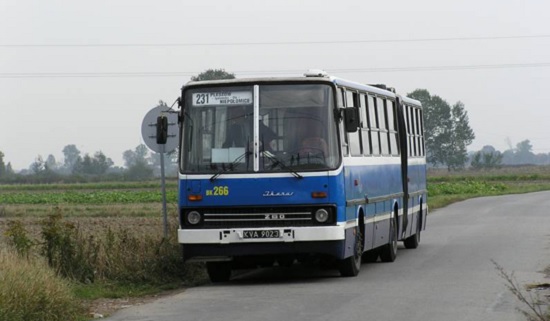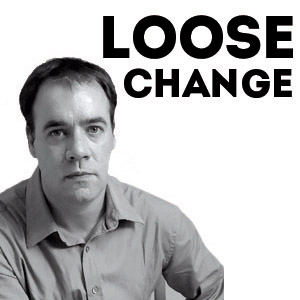Loose Change: The Miracle of Buses
I’m told the countryside has much to recommend it, and isn’t just there to put decent intervals between interesting places. For example, thenews.pl recently reported that crop circles with ‘magical strength’ had appeared in a Polish field. A local dowser is quoted as saying: “No evidence of human activities in the field is noticeable,” presumably apart from the 30-metre crop circles and, you know, the crops.
Summer is traditionally the time city dwellers get it into their heads to leave the city and have a look at the countryside. It’s not a coincidence that summer is also the time when people who spend very little time in the countryside get into all kinds of trouble there. Urbanites drown in lakes, get struck by lightning, see imaginary gorillas and generally provide country folk with a rich stock of hilarious stories to tell each other through the bitter winter months.
My own relationship with nature is complex. I like to go and look at nature from time to time, and nature likes to extract my blood with tiny, irritating mouth parts. I know my limits. No mountain hikes or white-water farces for me. I’m more comfortable in parts of the countryside with regular, reliable transport links to downtown.
This might seem like a deal-breaker, but that’s only because you are not aware of the miracle that is the MPK Krakow Agglomeration bus network. I’ve only discovered it recently myself. My only previous acquaintance with those mysterious ‘aglomeracja’ bus tickets was for trips to the airport. It turns out that Krakow city buses go to as many, if not more, places outside the city than in it. This is an almost absurdly convenient way to get out in the big green without messing about with cars and the evil of private minibuses.
Get on most buses and you can expect them to remain politely within the municipal limits, where buses belong. Not the aglomeracja bus. One minute they’re bowling through the blocks of Prądnik Czerwony like perfectly rational mass transit vehicles, and the next they’re off the rails completely, nosing down tiny country lanes with eagles wheeling overhead and bucolics types mowing beehives, or whatever they do. It’s easy to imagine yourself part an art house movie about a bus driver gone rogue.
 A veteran Krakow bus on its way to the home for retired public transport vehicles – DunBileting
A veteran Krakow bus on its way to the home for retired public transport vehicles – DunBileting
There are strange and exotic sounding places out there. The 221, for example, which transports you in city-style public transport comfort directly to charming Niepołomice, passes though Brzegi I and Brzegi III (no word on the mysterious fate of Brzegi II).
Heading north toward Ojców, the route of the 220 includes the flamboyantly-named Skrzyżowanie do Podchruścia. And who can pretend not to be curious as to exactly what Borki looks like?
After a predetermined period wandering about in the countryside, being satisfactorily bitten and sunstroked, the urban tripper simply wanders up to the nearest bus stop and waits. Invariably and on schedule, the city bus rounds the bend. emerging from a nearby forest like a tiny piece of roving civilisation, stops as if it’s the most natural thing in the world, and carries you back to a comforting reality where buildings outnumber trees and decent bars outnumber bears. Miraculous.


Have bus, will travel. Actually, what was astounding about Krakow and Poland this summer 2014 was its private freeways where you could go about 200 km per hour and every 100 or so km pay another 100 zloty or such and get to do it all over again, at regular intervals. No bad cars on those freeways. Only a car compartment armed with many 100 zloty bills. American style convenience stores on the side along with clean bathrooms. I know this from traveling like this for eight hours. See, my theory is the “bad” cars take the country roads that take forever to get to anywhere, and the lucky ones (in financial sense) get to take the quick roads. I did not see ANY buses on these freeways (they had two lanes in each direction), and maybe that explains why those Krakow buses ended up on those dingy country roads. The well off, it must be said, do not take trains or buses anymore. By the way, polish buses and public transportation is overall great, but It would have taken me twice as long to get to my destination in Poland by train or bus had I not taken the toll roads. With the train routes cut down or sizably reduced, where does that leave the average Pole? Yes, a quaint bus to a nice countryside location is lovey-dovey and swell and amusing, but not when you actually have to get somewhere. It cost me a pretty penny, not to mention the hundreds of zlotys for gas, which in Europe I find very expensive. That trip cost half a “typical Pole’s” paycheck. Maybe that is why those Polacy are so busy assessing your clothes and wallet size. Doesn’t make it ok, but isn’t life better with a good friend in the “fast lane”? Trust me, all I ever took in Poland a decade or two ago was planes, trains, and…actually, trains and buses. Dirty smelly trains, people peddling drinks and cigarettes from door to door, very frightening if you were traveling alone and approached by a very tall leathery looking guy with a gold tooth and some missing teeth and smelling like smoke looking into your compartment. Bit safer with trains. The only drawback, once in a while, was sharing the bus with the gypsies because the men would force the bus driver to “derail”, pull off road, so he could relieve himself by the tree. That, or threaten to do it on the bus. That is not to say the trains were not enjoyable, or the buses. I had some very interesting conversations with strangers. The only problem is they were all so slow and I am not so young anymore and interested in chatting with strangers, in person.